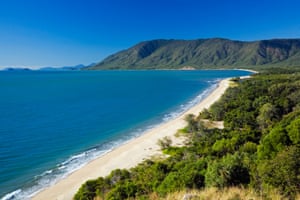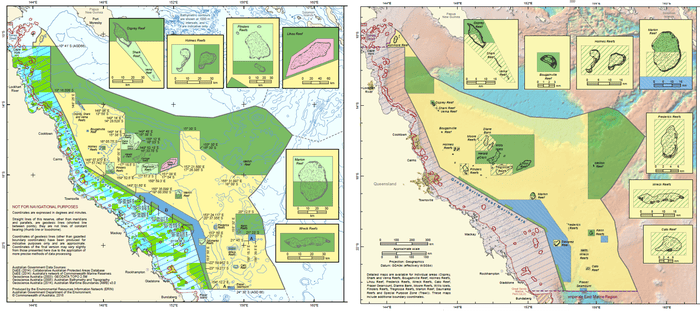Extract from The Guardian
Marine life
Big reductions in no-take marine protected areas are being considered, going beyond those recommended by an earlier federal government review
 Large areas of Queensland’s Coral Sea, as well as off the coast
of WA, NT and NSW, could have their fishing protection zones cut
further. Photograph: Andrew Watson/Getty Images/AWL Images RM
Large areas of Queensland’s Coral Sea, as well as off the coast
of WA, NT and NSW, could have their fishing protection zones cut
further. Photograph: Andrew Watson/Getty Images/AWL Images RM
Michael Slezak
Friday 21 July 2017 14.02 AEST Last modified on Friday 21 July 2017 15.55 AEST
Australia’s marine protected areas look set to be slashed by the federal government, with plans announced for cuts that go beyond those recommended by a review commissioned by the previous Abbott government.
Draft management plans released by the Director of National Parks on Friday propose that large areas of Queensland’s Coral Sea, as well as off the coast of Western Australia, the Northern Territory and New South Wales, will lose or have their protection downgraded, to make way for expanded long-line fishing and seafloor trawling – which have been shown to damage the conservation value of the oceans.
Big reductions in no-take zones have been planned in the Coral Sea, far more than the cuts recommended by the Abbott government review. Under earlier plans, only 46% of the coral sea would have been open to fishing, but under the new draft plans, 76% will be.
Overall, areas that allow fishing have been expanded from 64% in the Abbott-commissioned review to 80% in the new draft plans.
 The two maps show the already reduced green ‘no take’ zones in the Coral
Sea recommended by the Abbott government’s 2016 review (left), and the
draft plans released by the Turnbull government on Friday. Photograph:
Jessica Meeuwig, UWA
The two maps show the already reduced green ‘no take’ zones in the Coral
Sea recommended by the Abbott government’s 2016 review (left), and the
draft plans released by the Turnbull government on Friday. Photograph:
Jessica Meeuwig, UWA
The minister for the environment and energy, Josh Frydneberg, said the revised plans were “much more balanced” since they “allow sustainable activities like commercial fishing while protecting key conservation features”.
A network of 42 marine reserves was announced by Labor in 2012 after years of consultation, and consideration of more than 8,000 submissions. It was mostly welcomed by environmental groups but was designed to have a minimal impact on commercial activities, which led to some criticism from conservationists and scientists.
But when the Coalition was elected in 2013, the reserves were suspended. The then prime minister Tony Abbott said he did not want to “lock up our oceans” and that more consultation with the community was needed.
A report commissioned by the Abbott government last year recommended a 97,000 sq km reduction in no-take zoning, and increases in mixed-use areas to allow game fishing, longline fishing and underwater trawling. The Coral Sea, home to the Great Barrier Reef, suffered some of the biggest recommended cuts.
An independent analysis of the proposed changes found that the increased fishing would generate minuscule economic benefits to a handful of licence holders, while severely diminishing the environmental protections.
The Turnbull government has now announced draft plans that make further cuts, reducing the areas covered by no-take zones and lowering protections in the Coral Sea.
“These plans protect what needs to be protected, without negatively impacting communities and our country’s economy,” Frydenberg said in a statement. “This is a result of the Coalition government’s commitment to consult thoroughly with the communities who live near, care for and work on our oceans.”
Recreational fishers welcomed the changes. “These plans are definitely a large improvement on the plans produced by the previous Government that would have seen recreational fishers locked out of over 1.3 million square kilometres of Australian seas, with out any scientific justification,” said Allan Hansard managing director of the Australian Recreational Fishing Foundation.
“Now we have access to 97% of waters within 100km of the coast, and 80% of the whole network,” said Hansard.
The director of the Centre for Marine Futures at the University of Western Australia, Jessica Meeuwig, said the plans broke a government promise to make the changes evidence-based.
“The proposed protection zones for the Coral sea ignores all the science about what is needed to ensure we have healthy oceans and also ignores the government’s own risk assessments on what activities are compatible with conservation,” Meeuwig said.
“We have to get away from saying that everything in the ocean is open for exploitation because a risk hasn’t been demonstrated.”
The director of the Australian Marine Conservation Society, Darren Kindleysides, agreed. “All Australians will be justifiably distressed to know that science evidence supporting an increase in protections for marine life has been thrown out the window,” he said.
The Pew Charitable Trusts’ oceans director, Michelle Grady, said: “The threat to jobs, local businesses and to the survival of unique marine life could be avoided if the government instead chose to create an evidence-based balance for Australia’s oceans.”
“This is a huge step backwards for marine protection,” said head of oceans at WWF-Australia Richard Leck. “Australia used to be seen as a global leader in marine conservation. That will no longer be the case if these proposals are implemented,” he said.
“The Coral Sea is the Serengeti of the ocean. It’s one of the few places in the world where big species – sharks, tuna and bill fish – still roam in relative abundance,” Leck said.
“We should protect this wondrous place. Instead this iconic area will be open to more fishing pressure and the risk of degradation,” he said.
Marine life
Big reductions in no-take marine protected areas are being considered, going beyond those recommended by an earlier federal government review

Michael Slezak
Friday 21 July 2017 14.02 AEST Last modified on Friday 21 July 2017 15.55 AEST
Australia’s marine protected areas look set to be slashed by the federal government, with plans announced for cuts that go beyond those recommended by a review commissioned by the previous Abbott government.
Draft management plans released by the Director of National Parks on Friday propose that large areas of Queensland’s Coral Sea, as well as off the coast of Western Australia, the Northern Territory and New South Wales, will lose or have their protection downgraded, to make way for expanded long-line fishing and seafloor trawling – which have been shown to damage the conservation value of the oceans.
Big reductions in no-take zones have been planned in the Coral Sea, far more than the cuts recommended by the Abbott government review. Under earlier plans, only 46% of the coral sea would have been open to fishing, but under the new draft plans, 76% will be.
Overall, areas that allow fishing have been expanded from 64% in the Abbott-commissioned review to 80% in the new draft plans.

The minister for the environment and energy, Josh Frydneberg, said the revised plans were “much more balanced” since they “allow sustainable activities like commercial fishing while protecting key conservation features”.
A network of 42 marine reserves was announced by Labor in 2012 after years of consultation, and consideration of more than 8,000 submissions. It was mostly welcomed by environmental groups but was designed to have a minimal impact on commercial activities, which led to some criticism from conservationists and scientists.
But when the Coalition was elected in 2013, the reserves were suspended. The then prime minister Tony Abbott said he did not want to “lock up our oceans” and that more consultation with the community was needed.
A report commissioned by the Abbott government last year recommended a 97,000 sq km reduction in no-take zoning, and increases in mixed-use areas to allow game fishing, longline fishing and underwater trawling. The Coral Sea, home to the Great Barrier Reef, suffered some of the biggest recommended cuts.
An independent analysis of the proposed changes found that the increased fishing would generate minuscule economic benefits to a handful of licence holders, while severely diminishing the environmental protections.
The Turnbull government has now announced draft plans that make further cuts, reducing the areas covered by no-take zones and lowering protections in the Coral Sea.
“These plans protect what needs to be protected, without negatively impacting communities and our country’s economy,” Frydenberg said in a statement. “This is a result of the Coalition government’s commitment to consult thoroughly with the communities who live near, care for and work on our oceans.”
Recreational fishers welcomed the changes. “These plans are definitely a large improvement on the plans produced by the previous Government that would have seen recreational fishers locked out of over 1.3 million square kilometres of Australian seas, with out any scientific justification,” said Allan Hansard managing director of the Australian Recreational Fishing Foundation.
“Now we have access to 97% of waters within 100km of the coast, and 80% of the whole network,” said Hansard.
The director of the Centre for Marine Futures at the University of Western Australia, Jessica Meeuwig, said the plans broke a government promise to make the changes evidence-based.
“The proposed protection zones for the Coral sea ignores all the science about what is needed to ensure we have healthy oceans and also ignores the government’s own risk assessments on what activities are compatible with conservation,” Meeuwig said.
“We have to get away from saying that everything in the ocean is open for exploitation because a risk hasn’t been demonstrated.”
The director of the Australian Marine Conservation Society, Darren Kindleysides, agreed. “All Australians will be justifiably distressed to know that science evidence supporting an increase in protections for marine life has been thrown out the window,” he said.
The Pew Charitable Trusts’ oceans director, Michelle Grady, said: “The threat to jobs, local businesses and to the survival of unique marine life could be avoided if the government instead chose to create an evidence-based balance for Australia’s oceans.”
“This is a huge step backwards for marine protection,” said head of oceans at WWF-Australia Richard Leck. “Australia used to be seen as a global leader in marine conservation. That will no longer be the case if these proposals are implemented,” he said.
“The Coral Sea is the Serengeti of the ocean. It’s one of the few places in the world where big species – sharks, tuna and bill fish – still roam in relative abundance,” Leck said.
“We should protect this wondrous place. Instead this iconic area will be open to more fishing pressure and the risk of degradation,” he said.
No comments:
Post a Comment